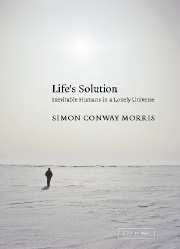Book contents
- Frontmatter
- Contents
- Preface. The Cambridge sandwich
- Acknowledgements
- List of abbreviations
- 1 Looking for Easter Island
- 2 Can we break the great code?
- 3 Universal goo: life as a cosmic principle?
- 4 The origin of life: straining the soup or our credulity?
- 5 Uniquely lucky? The strangeness of Earth
- 6 Converging on the extreme
- 7 Seeing convergence
- 8 Alien convergences?
- 9 The non-prevalence of humanoids?
- 10 Evolution bound: the ubiquity of convergence
- 11 Towards a theology of evolution
- 12 Last word
- Notes
- Index
1 - Looking for Easter Island
Published online by Cambridge University Press: 07 September 2009
- Frontmatter
- Contents
- Preface. The Cambridge sandwich
- Acknowledgements
- List of abbreviations
- 1 Looking for Easter Island
- 2 Can we break the great code?
- 3 Universal goo: life as a cosmic principle?
- 4 The origin of life: straining the soup or our credulity?
- 5 Uniquely lucky? The strangeness of Earth
- 6 Converging on the extreme
- 7 Seeing convergence
- 8 Alien convergences?
- 9 The non-prevalence of humanoids?
- 10 Evolution bound: the ubiquity of convergence
- 11 Towards a theology of evolution
- 12 Last word
- Notes
- Index
Summary
I am a bipedal hominid, of average cranial capacity, write my manuscripts with a fountain pen, and loathe jogging. Thanks to years of work by innumerable biologists I, or anyone else, can tell you to a fair degree of accuracy when the ability to walk upright began, the rate at which our brain increased to its present and seemingly astonishing size, and the origin of the five-fingered forelimb whose present versatility allows me to hold a pen, not to mention the fishy origin of those lungs that make such a noise as the joggers pass me early in the morning on Cambridge's Midsummer Common.
It is obvious that the entire fabric of evolution is imprinted on and through our bodies, from the architecture of our bony skeleton, to the proteins carrying the oxygen surging through our arteries, and our eyes that even unaided can see at least two million years into the past – the amount of time it has taken for the light to travel from the Andromeda Galaxy. In every case – whether for hand or brain – we can trace an ancestry that extends backwards for hundreds of millions, if not billions, of years. Yet, for all that, both the processes and the implications of organic evolution remain controversial. Now at first sight this is rather odd, because it is not immediately clear what is being called into question.
- Type
- Chapter
- Information
- Life's SolutionInevitable Humans in a Lonely Universe, pp. 1 - 21Publisher: Cambridge University PressPrint publication year: 2003



